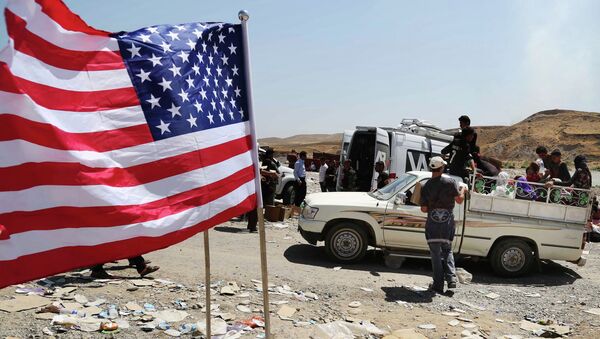LONDON, September 26 (RIA Novosti) — As the US bombs Syria, it is not just Iran’s government and the Islamic State it is bombing. It is bombing international law itself. To see why this is so, it is merely necessary to look at the arguments made by legal scholars in the US and in Britain who are trying to justify the bombing.
The Syrian government of Bashar Al Assad has not approved the bombing, nor has the UN Security Council. In the absence of such approval, western lawyers are struggling to justify it.
Ernesto J. Sanchez, a US attorney writing in The National Interest, and Marc Weller, Professor of International Law at the University of Cambridge, writing for the BBC, have advanced essentially the same argument: since the Islamic State in Iraq supposedly cannot be defeated unless it is bombed in Syria, the US is entitled to bomb the Islamic State in Syria in order to defend Iraq.
However, in order to justify doing this without the agreement of the Syrian government, both Sanchez and Weller claim that the Syrian government tolerates the presence of the Islamic State on its territory. However, this is far from the case: the two sides are fighting a bitter war in which the Islamic State was part of an insurgency the US and its friends originally supported. Recently the Islamic State captured Syrian army bases, killing hundreds of Syrian soldiers; sometimes it did so by beheading them after taking them prisoner.
Sanchez and Weller distort the meaning of self-defence. This is set out in Article 51 of the UN Charter:
“Nothing in the present Charter shall impair the inherent right of individual or collective self-defence if an armed attack occurs against a Member of the United Nations, until the Security Council has taken the measures necessary to maintain international peace and security. Measures taken by Members in the exercise of this right of self-defence shall be immediately reported to the Security Council and shall not in in any way affect the authority and responsibility of the Security Council under the present Charter to take at any time such action as it deems necessary in order to maintain or restore international peace and security.”
It is the Security Council, rather than the US or a “coalition of the willing” led by the US, which according to Article 51 decides how a UN member state like Iraq should be defended if it comes under armed attack from the territory of another country. As the wording of Article 51 makes clear, the concept of self-defence cannot be used to bypass the authority of the Security Council. However, that is exactly what Sanchez and Weller and a host of other western lawyers are trying to do.
Sanchez does not refer to the Security Council and Weller only does so in passing. He treats what he says was “the muted criticism” of the bombing by Russia and Syria at a Security Council session as “proof” of its legality.
It is nothing of the sort. What the “muted criticism” of Syria and Russia actually shows is not that the bombing is legal, but that it would have been possible to make it legal by obtaining permission from Syria and the Security Council. This would have been granted, although it would have been subject to certain conditions.
The US deliberately chose not to obtain permission from Syria or the Security Council. It did not want Syria’s because it is trying to overthrow its government. It did not want the Security Council’s because that would have acknowledged the authority of the Security Council as being higher than that of the President of the US, who ordered the bombing.
This is something the US, the “indispensable country” as it now calls itself, will no longer accept. In the words of Madeleine Albright, secretary of state during Clinton’s second term, “If we have to use force, it is because we are America; we are the indispensable nation. We stand tall and we see further than other countries into the future”.
Obama said the same thing in his recent speech at West Point. The US has the right to use force unilaterally and without the permission of the Security Council “when our core interests demand it; when our people are threatened; when our livelihoods are at stake; when the security of our allies is in danger”.
This rejects any limits, legal or otherwise, whether from the Security Council or from anyone else, on America’s absolute ability to wage war with impunity.
Within the US, the bombing is not being justified in the context of the defence of Iraq so much as a defence of the US itself. Sanchez and Weller obviate this. As Weller points out, and as US officials have admitted, there is no danger of imminent attack by the Islamic State upon the US such as would justify bombing the Islamic State in Syria without the permission of the Syrian government or of the Security Council.
The bombing of Syria is illegal and contradicts international law. It violates the UN Charter. The US had the option of obtaining the agreement of Syria and the Security Council, but declined to do so even though that would have made the bombing legal. Instead, the US chose to act illegally; it did so because it considers itself above the law.
Alexander Mercouris is a London-based lawyer. The views expressed in this article are the author’s and may not necessarily represent those of RIA Novosti.



